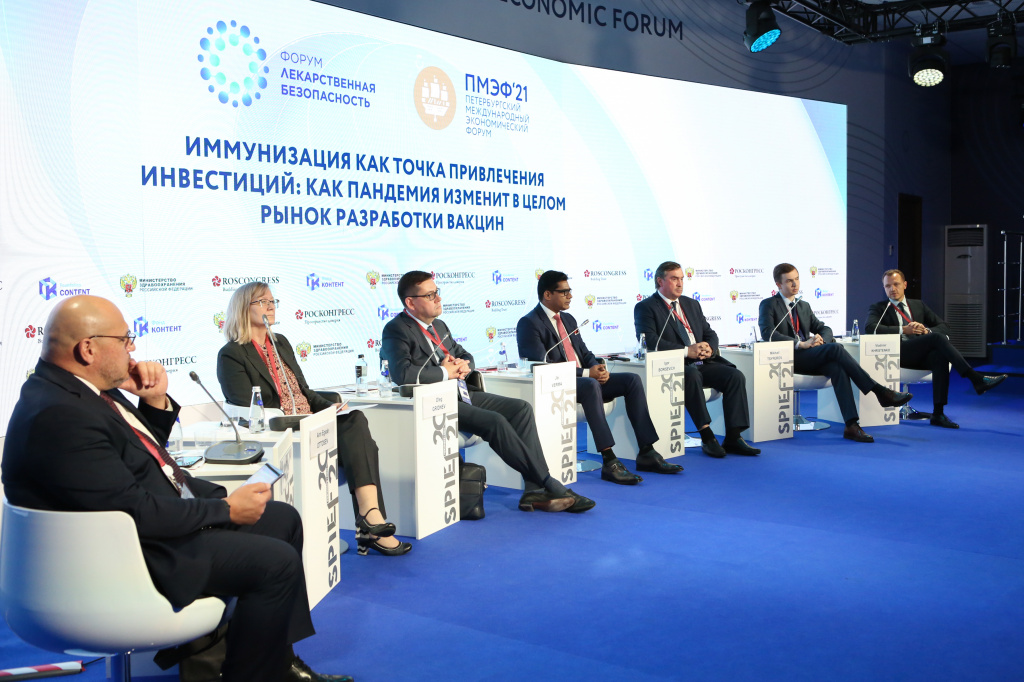
Immunization as an Investment Attraction Point
A panel session titled ‘Immunization as an Investment Attraction Point: How Will the Pandemic Change the Vaccine Development Market as a Whole?’ was held at the Drug Security Forum during the SPIEF 2021.
The event was attended by Russian Deputy Minister of Health Oleg Gridnev; Russian Federal Medical-Biological Agency Deputy Director Igor Borisevich; United Nations Children’s Fund Supply Division Senior Manager Ann Egede Ottosen; Petrovax Pharm President and Member of the Board of Directors Mikhail Tsyferov; Nanolek President Vladimir Khristenko; National Network of the Global Compact Association Chairman of the Governing Board Alexander Plakida; Chairman, and Protecti Global Holdings Chairman and CEO Jai Verma. The discussion was moderated by Dmitry Khalilov, a Partner and Life Sciences and Health Leader for Central, Eastern and Southeastern Europe, and Central Asia at EY.
“We are currently seeing the epidemiological situation stabilize, which is due to the timely updating of treatment regimens, taking into account the experience we have gained, as well as the implementation of preventive measures. I would like to remind you that our country was the first in the world to register a COVID-19 vaccine. To date, four vaccines have already been registered in Russia, each of which has shown high efficiency. Today, our job is to develop the production of vaccines, increase industrial capacity, and, of course, continue to develop the scientific base. These plans cannot be implemented without attracting substantial investments, and this is the issue that we are discussing today as part of the expert discussion,” Russian Deputy Minister of Health Oleg Gridnev said.
The pandemic has tested the immunization industry worldwide, and given it a new impetus. It has given rise to a trend of making next-generation vaccines which are safe, simple to produce, and potentially more universal. Today, enormous investment opportunities are helping to build new markets. These could help usher in a secure future – one in which innovative technologies are used to prevent new epidemics, new vaccines are employed in other areas of immunology, and effective efforts are made to combat new strains, serious infectious diseases, and a whole range of tropical diseases.
“Preventive vaccination is probably the most underestimated branch of healthcare and a boon that society has long become accustomed to and no longer appreciates. But the situation is changing. We are seeing a lot of public attention to the coronavirus. Of course, sooner or later, the virus will pass, but investments, production facilities, and expertise will remain, so it’s essential to preserve and develop the immunobiological industry,” Petrovax Pharm President Mikhail Tsyferov said.
The session participants discussed how the pandemic will impact the capacity of the global vaccine market, what criteria and risks may impact the investment appeal of the vaccine development market in the future, and whether projects related to virus research, the development of new platforms, and infectious disease prevention will be more heavily financed.
According to analysts from Morgan Stanley and Credit Suisse, the future coronavirus vaccine market may be worth over USD 10 billion a year. It is too early to forecast income from new vaccines, or to assess the impact the pandemic had on the vaccine market as a whole. However, regardless of whether the pandemic will impact only the current state of the vaccine market or will drive global changes in the future, COVID-19 provided the stimulus for opening new horizons in research and development as well as searching for technologies that could build a more sustainable and secure future.
The session was held with the support of Petrovax Pharm.








